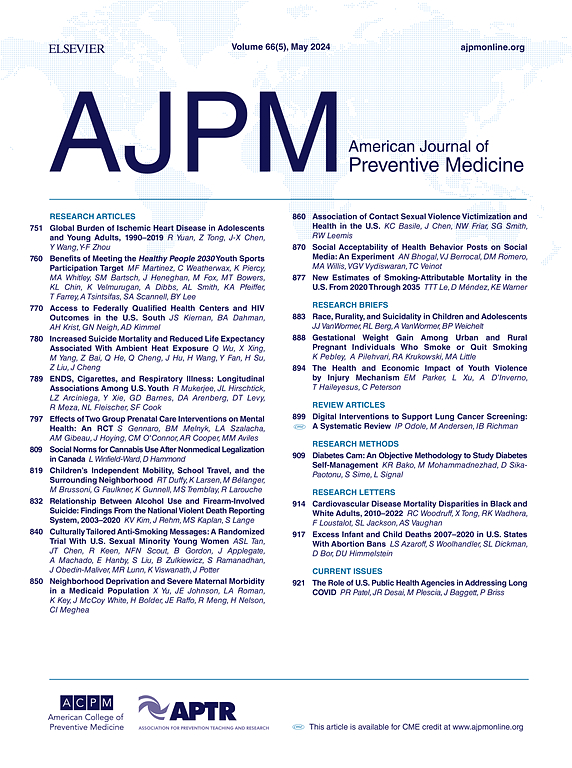Research Progress on Occupational Stress of Weightlifting Coaches
IF 4.5
2区 医学
Q1 MEDICINE, GENERAL & INTERNAL
引用次数: 0
Abstract
Introduction
This study aims to comprehensively review current research on occupational stress experienced by weightlifting coaches, emphasizing the primary sources of stress, its impacts, coping mechanisms, and effective intervention strategies. Recognizing occupational stress is crucial for enhancing coaches’ mental health, professional efficacy, and overall athlete performance.
Method
A systematic literature review was conducted, covering qualitative and quantitative studies published over the past two decades. Electronic databases including PubMed, PsycINFO, and SPORTDiscus were systematically searched using keywords such as “weightlifting coaches,” “occupational stress,” “job burnout,” and “coaching pressure.” Relevant literature was selected, analyzed, and synthesized to provide a comprehensive understanding of the topic.
Results
Key findings of this review include: (1) primary stressors such as performance pressures, administrative duties, interpersonal conflicts, and difficulty maintaining work-life balance significantly impact weightlifting coaches; (2) chronic stress often leads to burnout, manifesting as emotional exhaustion, depersonalization, and reduced professional satisfaction, consequently impairing coaching effectiveness and negatively influencing athlete performance; (3) coaches frequently employ coping strategies including seeking social support, physical activity, and mindfulness practices, though individual outcomes vary widely; and (4) organizational interventions, notably professional development, workload management, counseling services, and fostering supportive work environments, have been consistently effective in reducing occupational stress.
Discussion
Occupational stress remains a critical issue for weightlifting coaches, necessitating integrated individual and organizational approaches. Future studies should explore tailored, evidence-based interventions, quantify their effectiveness, and examine the long-term implications of stress to sustainably improve coaches’ health, job satisfaction, and athlete success.
举重教练员职业压力的研究进展
本研究旨在对举重教练职业压力的研究现状进行综述,重点介绍压力的主要来源、影响因素、应对机制以及有效的干预策略。认识职业压力对提高教练员的心理健康、职业效能和运动员的整体表现至关重要。方法对近二十年来发表的定性和定量研究进行系统的文献综述。包括PubMed、PsycINFO和SPORTDiscus在内的电子数据库使用“举重教练”、“职业压力”、“工作倦怠”和“教练压力”等关键词进行系统搜索。通过对相关文献的选择、分析和综合,对本课题有一个全面的了解。结果:(1)绩效压力、行政职责压力、人际冲突压力、工作与生活平衡困难等主要压力源对举重教练员有显著影响;(2)慢性应激往往导致职业倦怠,表现为情绪耗竭、人格解体和职业满意度降低,从而影响教练效能,对运动员成绩产生负面影响;(3)教练经常采用寻求社会支持、体育锻炼和正念练习等应对策略,但个体结果差异很大;(4)组织干预,特别是专业发展、工作量管理、咨询服务和培育支持性工作环境,在减少职业压力方面一直有效。职业压力仍然是举重教练的一个关键问题,需要综合个人和组织的方法。未来的研究应该探索量身定制的、基于证据的干预措施,量化其有效性,并检查压力对持续改善教练健康、工作满意度和运动员成功的长期影响。
本文章由计算机程序翻译,如有差异,请以英文原文为准。
求助全文
约1分钟内获得全文
求助全文
来源期刊

American Journal of Preventive Medicine
医学-公共卫生、环境卫生与职业卫生
CiteScore
8.60
自引率
1.80%
发文量
395
审稿时长
32 days
期刊介绍:
The American Journal of Preventive Medicine is the official journal of the American College of Preventive Medicine and the Association for Prevention Teaching and Research. It publishes articles in the areas of prevention research, teaching, practice and policy. Original research is published on interventions aimed at the prevention of chronic and acute disease and the promotion of individual and community health.
Of particular emphasis are papers that address the primary and secondary prevention of important clinical, behavioral and public health issues such as injury and violence, infectious disease, women''s health, smoking, sedentary behaviors and physical activity, nutrition, diabetes, obesity, and substance use disorders. Papers also address educational initiatives aimed at improving the ability of health professionals to provide effective clinical prevention and public health services. Papers on health services research pertinent to prevention and public health are also published. The journal also publishes official policy statements from the two co-sponsoring organizations, review articles, media reviews, and editorials. Finally, the journal periodically publishes supplements and special theme issues devoted to areas of current interest to the prevention community.
 求助内容:
求助内容: 应助结果提醒方式:
应助结果提醒方式:


